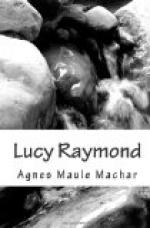She would sit, too, for half the morning apparently absorbed in a book; but Lucy noticed that, while thus seemingly occupied, she would gaze abstractedly at a page for long intervals without seeming to turn a leaf or get a line farther on. Lucy longed to be able to direct the mourner to the “balm in Gilead,” whose efficacy she knew by experience,—to the kind Physician who can bind up so tenderly the wounds that other healers cannot touch without aggravating. But she dared not utter a word of the sympathies of which her heart was full, and could only pray that a Higher Hand might deal with the sufferer.
One wet Sunday evening in April, Lucy came down in her waterproof cloak and rubbers, ready to set out for the neighbouring church, the one to which she had gone on the first Sunday of her arrival, and which she frequently attended when the weather was unfavourable, or when she had to go alone. She was not sorry when circumstances made this desirable, for she enjoyed the service and the sermon more than she did at the church the family usually attended. The words of the preacher seemed to come with more power and tenderness,—perhaps because he had himself been brought through much tribulation to know the God of all consolation, and had thus been made able to comfort others “by the comfort wherewith he himself was comforted of God.” At all events, it was certain that of the consolation abounding in Christ he was an earnest and able expounder.
“What! are you going out when it is so very wet?” asked Stella, as her cousin entered the room. Sophy, who had been gazing moodily into the fire over the book she was holding, started up, saying, “I think I’ll go with you, Lucy. Wait a few minutes for me.” Her mother remonstrated a little; but Sophy’s restless longing for change and action of some kind was often uncontrollable, and the two girls set out through the wind and rain, clinging closely together to support each other on the wet and slippery pavement.
How earnestly Lucy prayed in silence, as they traversed the short distance, that the preacher they were going to hear might have a special message to the troubled, heavy heart beside her, and how intensely did she listen to the prayers the minister offered up, to catch any petitions that might seem suited to her cousin’s need! She was slightly disappointed when he announced his text, “O Israel, thou hast destroyed thyself, but in me is thy help found,” for she had hoped that it would be one of the many beautiful, comforting passages in which the New Testament abounds. But her disappointment wore off as he proceeded with his discourse.
He first briefly sketched the history of the rebellion of Israel in departing from the God of her help, and in transferring to the idols of the heathen the allegiance which was due to the living God. He vividly described the “destruction” which must be the natural result of such a departure from the source of her highest life. Then he spoke of the means by which God sought to bring her back,—of the purifying judgments which He sent, in love and mercy, to restore her to spiritual health, and of the inexhaustible supply of “help,” of tender compassion and restoring power, with which He was ready to meet her on her return.




